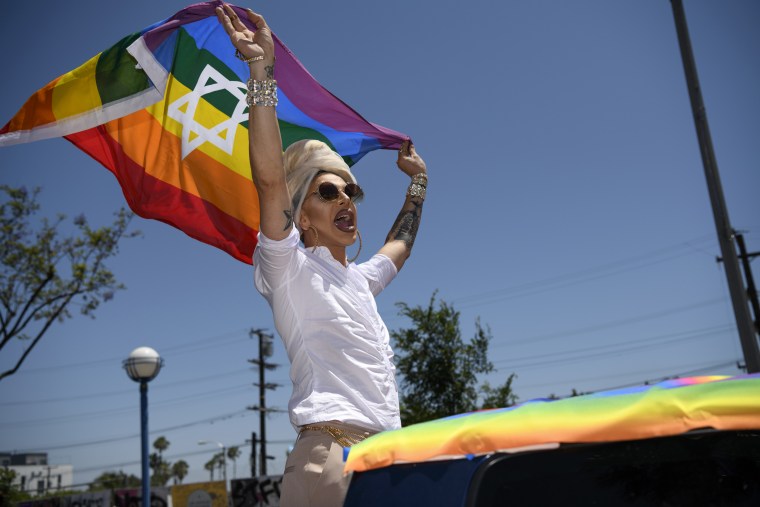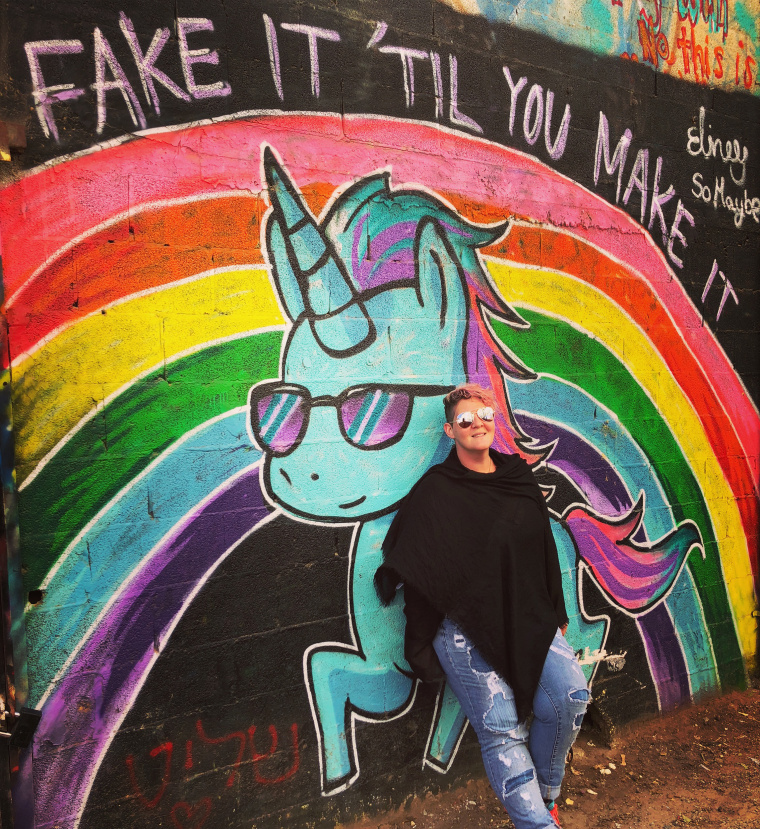‘Being Gay is not Enough’: Buttigieg’s Candidacy Divides LGBTQ Democrats
When Pete Buttigieg walked away from this month’s Iowa caucuses with the most delegates, it marked the first time an openly gay candidate had ever won a state’s presidential nominating contest. But if anyone was expecting a collective celebration from all corners of the LGBTQ community, they were disappointed.
“It’s truly embarrassing to have the first gay presidential candidate of this magnitude be this conservative — next,” poet Alex Dimitrov wrote on Twitter the day after the caucuses on Feb. 3.
While Buttigieg certainly has his fair share of queer supporters — including several LGBTQ officials and a number of the country’s largest gay advocacy groups — his historic candidacy has contributed to long-simmering tensions within the community boiling into public view. While the policies of the former mayor of South Bend, Indiana, play a part, the tensions appear to center on power, privilege and representation within the diverse lesbian, gay, bisexual, transgender and queer community.
A ‘middle of the road’ message
Buttigieg’s strong showings in Iowa and the New Hampshire primary a week later were not powered by gay voters — and may even have happened in despite of them. Media entrance polls in Iowa foundthat only 22 percent of LGBTQ Democrats surveyed said they intended to caucus for Buttigieg, while 24 percent chose Sen. Elizabeth Warren of Massachusetts and 42 percent Sen. Bernie Sanders, the independent of Vermont.
“I can’t just throw my support behind him because we’re both gay,” Reid Chandler, 28, a Des Moines resident, said of Buttigieg.
While Chandler said he was excited to see an openly gay candidate when Buttigieg first visited Iowa, he ultimately chose to caucus for Warren for several reasons.
“I don’t believe Pete’s ‘middle of the road’ message meets our moment,” Chandler explained. “He doesn’t represent the margins of the LGBTQ spectrum.”
“Queer people are pushed to the margins. I want someone that has suffered in ways that are very pronounced and will inform their policies.”
Even prior to Iowa, at least two other surveys showed LGBTQ primary voters favoring Warren and Sanders, the leading progressives in the race for the Democratic nomination.
Despite not caucusing for Buttigieg, however, Chandler did say that he respects the former mayor and military veteran and is inspired by his candidacy. But that sentiment is not shared by everyone in the LGBTQ community.
Queers Against Pete, a collective run by queer people from across the country, released an open letter on Jan. 30 expressing opposition to Buttigieg, asserting that the “LGBTQIA community deserves better than Pete.” On Wednesday, the group said its open letter surpassed 4,000 signatures.
“Some have touted former South Bend Mayor Pete Buttigieg’s openly gay identity as proof of progress in our politics,” the letter states. “However, being gay is not enough to earn the support of LGBTQIA communities.”
The letter goes on to criticize Buttigieg for opposing “complete Medicare for All,” not having a plan to “create an alternative to police” and not supporting the cancellation of student loan debt, among a number of other issues. While these are not policies specific to the LGBTQ community, Queers Against Pete argues that the community is “directly and disproportionately” affected by a number of these issues.
The collective is not currently endorsing anyone, and representatives for the group said Buttigieg is not the only candidate whose policies group members believe harm queer and other marginalized communities. However, members are choosing to speak out against Buttigieg because they believe that, as queer people, they’ll be heard.
“We are uniquely positioned as LGBTQIA+ people to state our opposition to Pete,” representatives of the group from Illinois, Nevada and Washington, D.C., said in an email. The group claimed that black voters, with whom Buttigieg has struggled to make inroads, have been called “homophobic” for pushing back against Buttigieg’s policies.
Related
Bloomberg should apologize for comments about transgender people, LGBTQ rights group says
The Buttigieg campaign said the candidate has respectfully engaged with Queers Against Pete activists when they have protested his events. The campaign also pointed to a list of policy proposals in Buttigieg’s LGBTQ platform that address issues like housing, criminal justice and HIV/AIDS.
Christopher Cabaldon, 54, is a Buttigieg supporter and mayor of the northern California city of West Sacramento. He said Buttigieg’s policies are driven by his conclusions about what’s best for most Americans, not a desire to uphold power structures that have harmed LGBTQ people.
Cabaldon, who is gay and Filipino American, pushed back on Buttigieg’s critics and noted that queer people and people of color have a wide variety of policy views.
“The majority of these communities that I’m a part of don’t have a uniformed point of view on the policies,” he said. “Yet some declare there’s a set of principles we all have to subscribe to.”
“To disagree about health care financing doesn’t make us less gay or queer,” he added.
An ‘assimilationist gay’?
Other Buttigieg critics have focused on his identity and perceived values.
Han Koehle, 31, of Santa Barbra, California, is still undecided. However, Koehle, who is nonbinary and uses they/them pronouns, knows who they are against. Part of Koehle’s opposition to Buttigieg is the belief that his identity — a white, cisgender, middle-class man who passed as straight until he came out in 2015 — informs his world view.
“He wants relatively powerful gay people to be allowed to live in hetero society,” Koehle wrote in an open letter shared on Facebook, adding that Buttigieg is “willing to sell out” poor LGBTQ people of color “and otherwise misfit and downtrodden members of our community to do it.”
Related
Buttigieg to Trump: My marriage never involved ‘hush money to a porn star’
Koehle is among those who say Buttigieg’s relative privilege as an “assimilationist gay” is interconnected to his political and philosophical beliefs. In an interview with NBC News, Koehle said Buttigieg’s “privilege” is why, for example, he doesn’t believe in restoring voting rights to currently incarcerated felons, and why he made conciliatory comments about Chick-fil-A’s anti-gay history rather than a forceful rebuke. (Last year, Buttigieg said he doesn’t approve of the fast food franchise’s politics, but likes their chicken and hopes he can “build a bridge” with them.)
“Queer people are pushed to the margins. I want someone that has suffered in ways that are very pronounced and will inform their policies,” Kohele said. “Not someone who goes out of his way to side with Chick-fil-A.”
Jackie Thomas, 55, is a black lesbian who lives in Palm Springs, California, and has been active in LGBTQ advocacy for decades. She said she’s been undecided in the Democratic primary race since Sen. Kamala Harris of California dropped out. However, she said she is currently leaning toward Buttigieg, partially because of his identity.
“Of all the candidates, he has the best perspective of what it’s like to be marginalized, to be on the outside looking in,” she said. “African Americans share more in common with Pete than we recognize.”
She also said she appreciated his comments about Chick-fil-A.
“I loved that. It’s actually what got me to take a second look at him, because it was honest. You never hear honesty,” she said. “Not everything has to be a knock-down fight.”
‘Gay people don’t have to be queer’
Over the last several decades, the word “queer” has evolved from a negative epithet to a description of anyone who identifies as nonheterosexual, noncisgender or both. But for some, the term goes beyond an identifier and has political connotations — and to many who subscribe to this belief, Buttigieg is not part of the club.
“The issue is not that Pete isn’t queer enough,” Koehle wrote in their open letter. “Pete isn’t queer at all.”
“Queer, as an umbrella term, refers not just to a range of genders and sexualities but to a specific political project that has to do with reclaiming and dismantling heterosexism and cissexism,” Koehle added. “Gay people can be queer, but gay people don’t have to be queer.”
Maddie Schumacher, 21, a resident of Washington, D.C., supports Sanders and was “disappointed” with Buttigieg’s strong showings in Iowa and New Hampshire, lamenting that his politics are not “queer.”
“I never liked Pete as a candidate, because he’s not progressive and takes money from billionaires,” Schumacher, who is nonbinary and uses they/them pronouns, said. “It would have been so cool if we all could have rallied around the first queer candidate.”
Related
Who’s the ‘Q’ in LGBTQ? Study shines light on ‘queer’ identities.
When Buttigieg and his husband, Chasten, graced the cover of TIME magazine last May, some LGBTQ people took issue with how “heterosexual” they presented.
“This photo is about a lot of things, but one of its defining features is its heterosexuality,” Yale professor and essayist Greta LaFleur wrotein the Los Angeles Review of Books. “It’s offering us the promise that our first gay first family might actually be a straight one.”
Others, however, have taken offense to the suggestion that dressing or acting in a certain way is required to be considered “gay enough.”
“This notion that the first openly gay candidate for president is insufficiently gay is homophobic,” Skylar Baker-Jordan, a writer from Tennessee, said in The Independent in December. “It pretends that if you’re not a polyamorous self-identifying ‘queer’ who lives in New York, San Francisco, or Los Angeles (or, to put it bluntly, a stereotype) that you’re not doing homosexuality right.”
And while some have questioned Buttigieg’s lack of “queer” appeal, others have taken issue with him not using the term to describe himself. Thomas, the Palm Springs activist, said whether one embraces the term should not be seen as some sort of litmus test.
“I’ve seen that word change so many times,” Thomas said. “Whether it resonates is a personal choice.”

